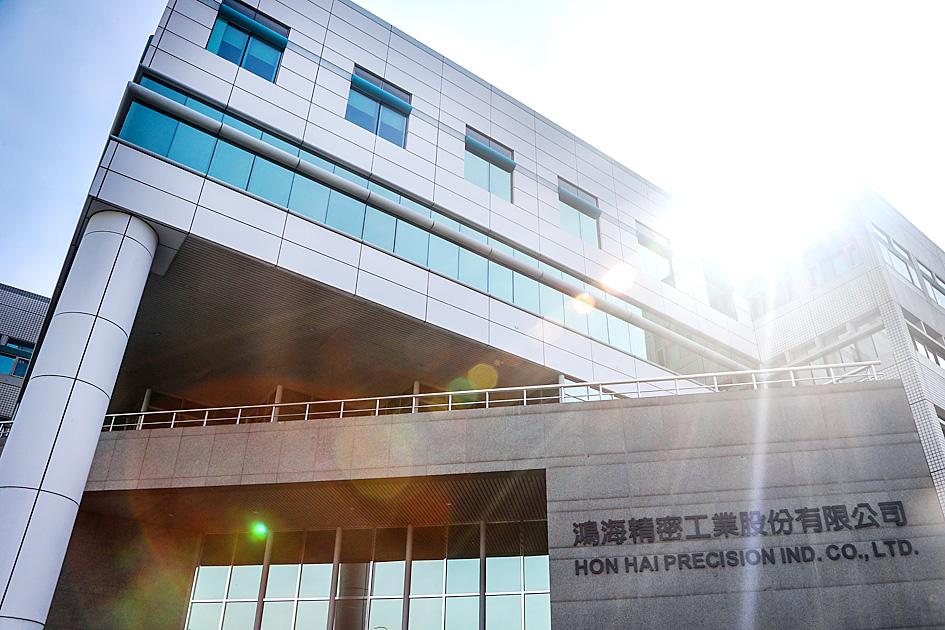Hon Hai Precision Industry Co (鴻海精密) on Friday reopened its production base in Vietnam’s northern Bac Giang Province after a vaccination program eased concerns over COVID-19 infections.
The vaccination program targets workers in the province’s four major industrial parks and the Hon Hai plant has been listed as a model in COVID-19 prevention measures, Vietnam News Agency reported on Thursday.
The provincial government in the middle of this month ordered factories in the industrial parks closed after a new wave of COVID-19 infections emerged in Vietnam late last month, spreading across 30 provinces and cities, with Bac Giang one of the most seriously affected.

Photo: CNA
The shutdown in Bac Giang affected thousands of factories run by local and foreign firms, as well as more than 130,000 workers, the VnExpress news site reported.
The province has 178 foreign investors, including iPhone assembler Hon Hai, known as Foxconn Technology Group (富士康科技集團) outside of Taiwan, runs four factories there through a subsidiary, VnExpress reported, citing provincial authorities.
Hon Hai also runs a production base in the northern Bac Ninh Province, where a vaccination program has also been launched.
Hon Hai and its subsidiaries in Vietnam have said they would make donations to help with virus prevention in the neighborhoods close to its production bases, vowing to follow the Vietnamese authorities’ directions to adjust its virus prevention policy.
Vietnam has become one of Hon Hai’s most important production bases outside of China. According to Apple Inc’s latest supplier list, Hon Hai’s Bac Giang complex is among the US company’s suppliers.
Hon Hai’s subsidiaries have also set up footholds in Vietnam.
Among them, Foxconn Interconnect Technology Ltd (鴻騰精密), a connector maker, and integrated circuit packaging and testing firm ShunSin Technology Holdings Ltd (訊芯科技) have also established production lines in Bac Giang.
Vietnam had initially succeeded in containing the virus. Early this month, it had recorded just more than 3,100 confirmed cases and 35 deaths since the start of the pandemic.
However, over the past few weeks, Vietnam has confirmed more than 3,500 new cases and 12 deaths, increasing the death toll to 47.
Most of the new transmissions were found in Bac Ninh and Bac Giang, two provinces with dense industrial zones where hundreds of thousands of people work for major companies including Hon Hai, Samsung Electronics Co, Canon Inc and Luxshare Precision Industry Co (立訊精密), a Chinese supplier to Apple.
Despite strict health regulations, a company in Bac Giang discovered that one-fifth of its 4,800 workers had tested positive for the virus.
Separately, Hon Hai founder Terry Gou (郭台銘) said in a statement on Saturday that his charity Yonglin Foundation plans to apply for 5 million doses of the BioNTech SE COVID-19 vaccine made and packaged in Germany to be imported into Taiwan.
The shots would be airlifted from Germany to Taiwan without going through any intermediaries, he added.
Additional reporting by AP and Reuters

‘SWASTICAR’: Tesla CEO Elon Musk’s close association with Donald Trump has prompted opponents to brand him a ‘Nazi’ and resulted in a dramatic drop in sales Demonstrators descended on Tesla Inc dealerships across the US, and in Europe and Canada on Saturday to protest company chief Elon Musk, who has amassed extraordinary power as a top adviser to US President Donald Trump. Waving signs with messages such as “Musk is stealing our money” and “Reclaim our country,” the protests largely took place peacefully following fiery episodes of vandalism on Tesla vehicles, dealerships and other facilities in recent weeks that US officials have denounced as terrorism. Hundreds rallied on Saturday outside the Tesla dealership in Manhattan. Some blasted Musk, the world’s richest man, while others demanded the shuttering of his

Taiwan’s official purchasing managers’ index (PMI) last month rose 0.2 percentage points to 54.2, in a second consecutive month of expansion, thanks to front-loading demand intended to avoid potential US tariff hikes, the Chung-Hua Institution for Economic Research (CIER, 中華經濟研究院) said yesterday. While short-term demand appeared robust, uncertainties rose due to US President Donald Trump’s unpredictable trade policy, CIER president Lien Hsien-ming (連賢明) told a news conference in Taipei. Taiwan’s economy this year would be characterized by high-level fluctuations and the volatility would be wilder than most expect, Lien said Demand for electronics, particularly semiconductors, continues to benefit from US technology giants’ effort

ADVERSARIES: The new list includes 11 entities in China and one in Taiwan, which is a local branch of Chinese cloud computing firm Inspur Group The US added dozens of entities to a trade blacklist on Tuesday, the US Department of Commerce said, in part to disrupt Beijing’s artificial intelligence (AI) and advanced computing capabilities. The action affects 80 entities from countries including China, the United Arab Emirates and Iran, with the commerce department citing their “activities contrary to US national security and foreign policy.” Those added to the “entity list” are restricted from obtaining US items and technologies without government authorization. “We will not allow adversaries to exploit American technology to bolster their own militaries and threaten American lives,” US Secretary of Commerce Howard Lutnick said. The entities

Minister of Finance Chuang Tsui-yun (莊翠雲) yesterday told lawmakers that she “would not speculate,” but a “response plan” has been prepared in case Taiwan is targeted by US President Donald Trump’s reciprocal tariffs, which are to be announced on Wednesday next week. The Trump administration, including US Secretary of the Treasury Scott Bessent, has said that much of the proposed reciprocal tariffs would focus on the 15 countries that have the highest trade surpluses with the US. Bessent has referred to those countries as the “dirty 15,” but has not named them. Last year, Taiwan’s US$73.9 billion trade surplus with the US